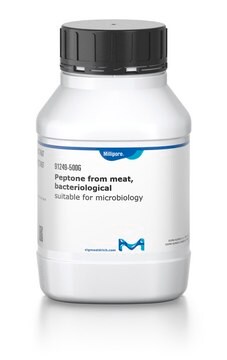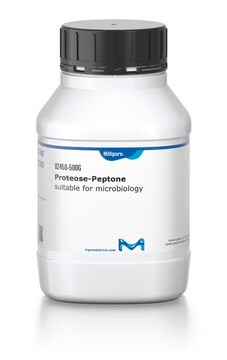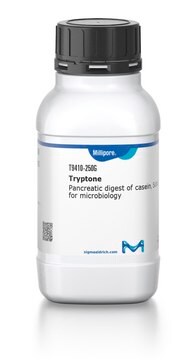Alle Fotos(2)
Wichtige Dokumente
81260
Poly(ethylenglykol)
average Mn 6,000, hydroxyl
Synonym(e):
PEG
Anmeldenzur Ansicht organisationsspezifischer und vertraglich vereinbarter Preise
Alle Fotos(2)
About This Item
Lineare Formel:
H(OCH2CH2)nOH
CAS-Nummer:
MDL-Nummer:
UNSPSC-Code:
12352104
PubChem Substanz-ID:
NACRES:
NA.23
Empfohlene Produkte
product name
Poly(ethylenglykol), average Mn 6,000
Form
flakes
Qualitätsniveau
Mol-Gew.
Mn 5,000-7,000
average Mn 6,000
pH-Wert
4.5-7.5
mp (Schmelzpunkt)
60-63 °C
Ω-Ende
hydroxyl
α-Ende
hydroxyl
SMILES String
C(CO)O
InChI
1S/C2H6O2/c3-1-2-4/h3-4H,1-2H2
InChIKey
LYCAIKOWRPUZTN-UHFFFAOYSA-N
Suchen Sie nach ähnlichen Produkten? Aufrufen Leitfaden zum Produktvergleich
Allgemeine Beschreibung
Polyethylene glycol (PEG) is a hydrophilic polymer. It can be easily synthesized by the anionic ring opening polymerization of ethylene oxide, into a range molecular weights and variety of end groups. When crosslinked into networks PEG can have high water content, forming "hydrogels". Hydrogel formation can be initiated by either crosslinking PEG by ionizing radiation or by covalent crosslinking of PEG macromers with reactive chain ends. PEG is a suitable material for biological applications because it does not trigger an immune response.
Anwendung
It has been used to modify therapeutic proteins and peptides to increase their solubility.
Photopolymerized PEG hydrogels have emerging applications in the fabrication of bioactive and immunoisolating barriers for encapsulation of cells.
Photopolymerized PEG hydrogels have emerging applications in the fabrication of bioactive and immunoisolating barriers for encapsulation of cells.
Ähnliches Produkt
Produkt-Nr.
Beschreibung
Preisangaben
Lagerklassenschlüssel
11 - Combustible Solids
WGK
WGK 1
Flammpunkt (°F)
Not applicable
Flammpunkt (°C)
Not applicable
Persönliche Schutzausrüstung
Eyeshields, Gloves, type N95 (US)
Hier finden Sie alle aktuellen Versionen:
Besitzen Sie dieses Produkt bereits?
In der Dokumentenbibliothek finden Sie die Dokumentation zu den Produkten, die Sie kürzlich erworben haben.
Kunden haben sich ebenfalls angesehen
Joo-Hyung Choi et al.
Veterinary microbiology, 236, 108374-108374 (2019-09-11)
Foot-and-mouth disease (FMD) is a highly contagious disease and causes economic damage at a national level. In particular, the type O FMD virus (FMDV) is a serotype that causes FMD outbreaks most frequently in the world. In recent years, Southeast
Ji Hyeon Hwang et al.
Journal of veterinary science, 20(3), e29-e29 (2019-06-05)
Vaccination is one of the most effective ways of controlling and preventing foot-and-mouth disease (FMD) outbreaks. The effective prevention of this disease requires the use of high-quality vaccines to meet the criteria that enable customers to use them simply. The
Su-Hwa You et al.
Veterinary microbiology, 234, 44-50 (2019-06-20)
Foot-and-mouth disease virus (FMDV) is the cause of an economically devastating disease in major cloven-hoofed livestock. Although type C foot-and-mouth disease (FMD) has not occurred anywhere worldwide since 2004, the antigen bank should be preserved in preparation for an unexpected
Tuberous Sclerosis Complex Axis Controls Renal Extracellular Vesicle Production and Protein Content.
Fahad Zadjali et al.
International journal of molecular sciences, 21(5) (2020-03-07)
The tuberous sclerosis complex (Tsc) proteins regulate the conserved mTORC1 growth regulation pathway. We identified that loss of the Tsc2 gene in mouse inner medullary collecting duct (mIMCD) cells induced a greater than two-fold increase in extracellular vesicle (EV) production
Marc D Hein et al.
Applied microbiology and biotechnology, 105(1), 129-146 (2020-12-05)
The novel influenza A virus (IAV) defective interfering particle "OP7" inhibits IAV replication in a co-infection and was previously suggested as a promising antiviral agent. Here, we report a batch-mode cell culture-based production process for OP7. In the present study
Unser Team von Wissenschaftlern verfügt über Erfahrung in allen Forschungsbereichen einschließlich Life Science, Materialwissenschaften, chemischer Synthese, Chromatographie, Analytik und vielen mehr..
Setzen Sie sich mit dem technischen Dienst in Verbindung.




